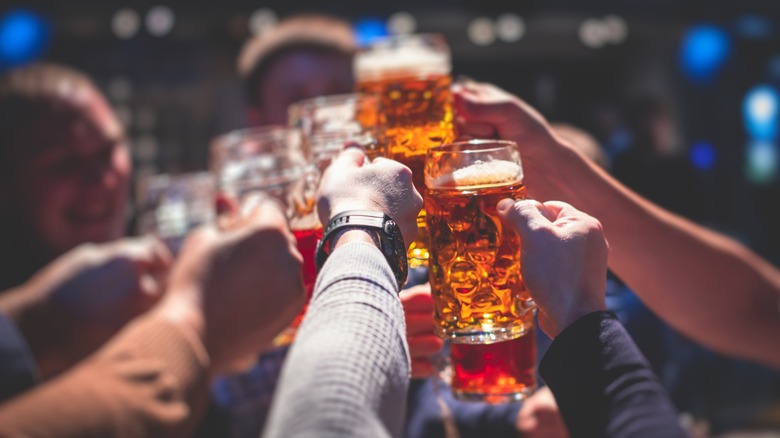Can Alcohol Consumption Lead To Strokes Earlier In Life?
When it comes to strokes, anything that can significantly impact the risk shouldn't be overlooked. If you enjoy drinking alcohol, you should know there is a link between drinking and strokes.
A stroke is a medical emergency that occurs when the blood supply to the brain is interrupted, and a part of the brain doesn't get enough nutrients and oxygen (via Mayo Clinic). Symptoms of a stroke include trouble speaking, paralysis, headache, and walking. Strokes can also lead to permanent disability or death. According to the World Stroke Organization, incidences of strokes not only increased by 70% from 1990 to 2019, but they are currently the second leading cause of death worldwide. The prevalence of strokes should raise concern as the causes that contribute to them are modifiable (per Circulation Research).
Two types of strokes can occur ischemic and hemorrhagic (per Mayo Clinic). Ischemic stroke results from blood clots or fatty deposits lodged in a blood vessel and blocking flow to the brain. A hemorrhagic stroke is less common and occurs when a blood vessel in the brain leaks due to issues such as high blood pressure, aneurysms, vessel wall weakness, and trauma. It's known that risk factors such as high blood pressure, high cholesterol, smoking, obesity, and inactivity can all lead to stroke. The truth about alcohol's effects and dangers has been debated, and recent studies have shed more light on its relationship to stroke risk.
Alcohol is connected to strokes in young adults
A 2016 study found that 90% of strokes can be attributed to modifiable risk factors due to behavior and metabolic factors, including alcohol consumption. Hence the importance of continued research into how much alcohol is safe. Previously it was thought that alcohol might have a protective effect against stroke, which could lead some to feel safe with moderate consumption.
In contrast, a 2019 study found that moderate alcohol use was directly connected to stroke occurrence as it not only failed to protect against stroke but also increased its risk. Interestingly the study also found that alcohol increases blood pressure, a risk factor for stroke. While this connection is disheartening, an even more concerning finding was just released in a 2022 study.
The study included 1,536,668 subjects ages 20 to 39 tested over four years for stroke risk. The group was separated into four categories: non, mild, moderate, and heavy drinkers, with mild drinkers consuming 105 g per week. 3,153 of these subjects had a stroke, and those who drank more than 105 g per week had significantly higher risks for stroke, which increased after 2,3, and 4 years. Researchers advised young adults to reduce alcohol consumption to help prevent stroke. It's important to note that 105 g of alcohol is equivalent to 7.5 beers (per the NIAAA). Nevertheless, as of 2019, the World Stroke Organization reports 8% of the 13.7 million annual strokes now occur in people under 44.


